人教新目标(Go for it)版八年级下Unit 3 Could you please clean your room? Section B writing课件(17张PPT)
文档属性
| 名称 | 人教新目标(Go for it)版八年级下Unit 3 Could you please clean your room? Section B writing课件(17张PPT) |

|
|
| 格式 | pptx | ||
| 文件大小 | 759.6KB | ||
| 资源类型 | 教案 | ||
| 版本资源 | 人教新目标(Go for it)版 | ||
| 科目 | 英语 | ||
| 更新时间 | 2022-03-19 00:00:00 | ||
图片预览

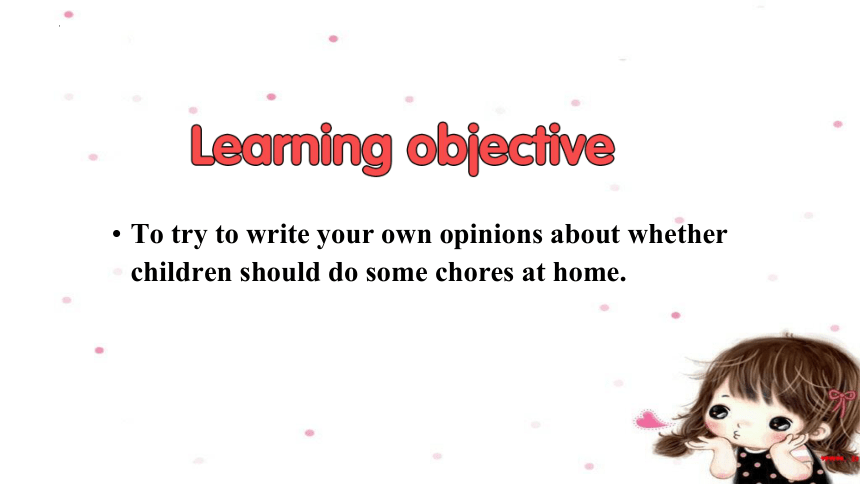
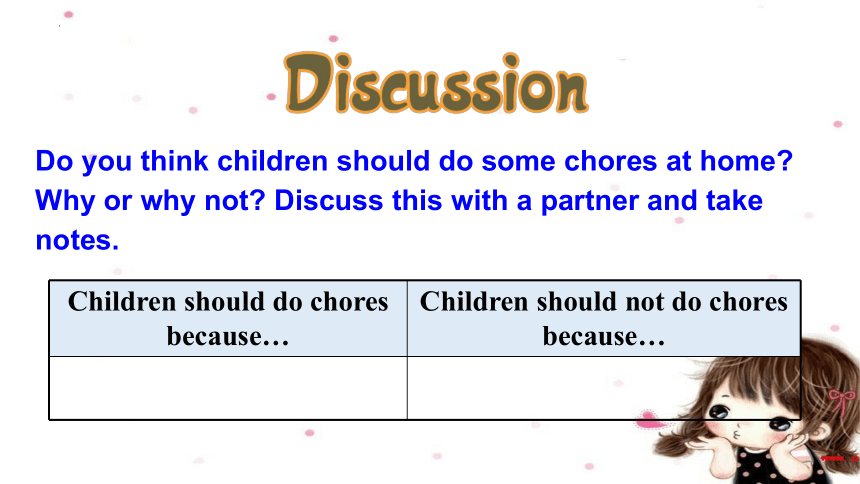
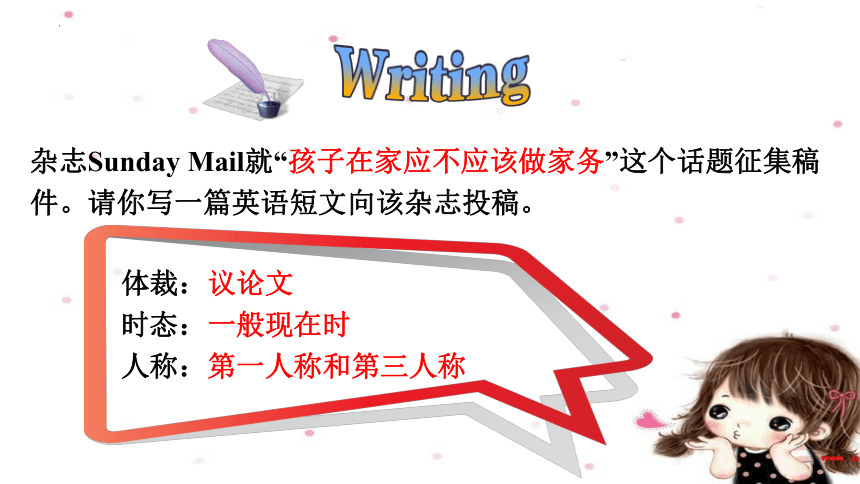
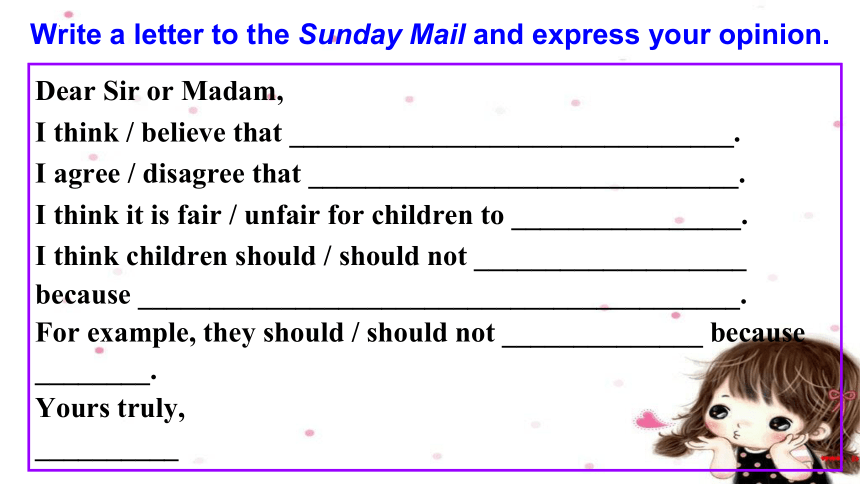
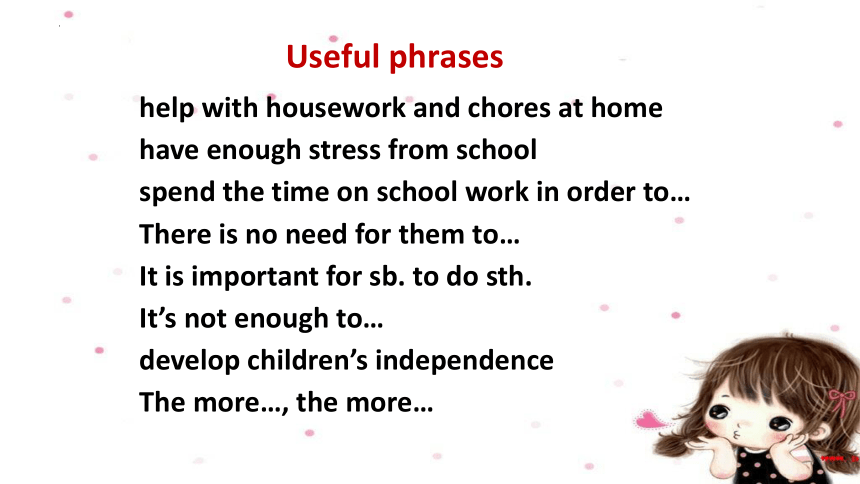
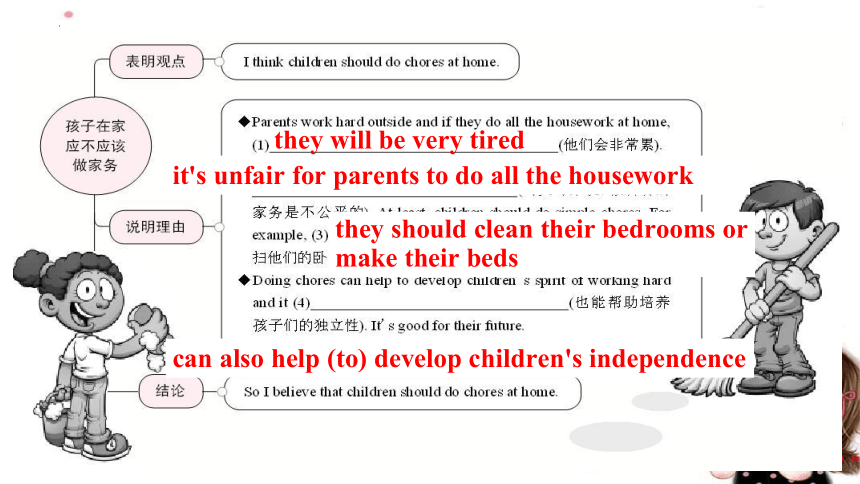
文档简介
(共17张PPT)
Unit 3
Could you please clean your room
Section B Wrting
To try to write your own opinions about whether children should do some chores at home.
Do you think children should do some chores at home Why or why not Discuss this with a partner and take notes.
Children should do chores because… Children should not do chores because…
杂志Sunday Mail就“孩子在家应不应该做家务”这个话题征集稿件。请你写一篇英语短文向该杂志投稿。
体裁:议论文
时态:一般现在时
人称:第一人称和第三人称
Write a letter to the Sunday Mail and express your opinion.
Dear Sir or Madam,
I think / believe that _______________________________.
I agree / disagree that ______________________________.
I think it is fair / unfair for children to ________________.
I think children should / should not ___________________
because __________________________________________.
For example, they should / should not ______________ because ________.
Yours truly,
__________
help with housework and chores at home
have enough stress from school
spend the time on school work in order to…
There is no need for them to…
It is important for sb. to do sth.
It’s not enough to…
develop children’s independence
The more…, the more…
Useful phrases
they will be very tired
it's unfair for parents to do all the housework
they should clean their bedrooms or make their beds
can also help (to) develop children's independence
本文在表明观点后,需要阐述支撑观点的理由,为此,可以先用Here are three reasons来承上启下,使文章过渡自然。然后具体的理由可以用first, second, third来衔接,以使行文条理清晰、紧密相连。
英文信件一般包括六个部分:信头、信内姓名地址、称呼、正文、结束语和签名。
1)信头(heading):寄信人的地址和发信日期,写在信纸的右上角,先写地址后写日期,地址按由小到大的顺序写。
2)信内姓名地址(inner address):收信人的姓名和地址,写在信纸的左侧,称呼的上方。在个人信件中,信内姓名地址可以省略。
3)称呼(salutation):收信人的称呼,写在信纸的左边,顶格写起。
4)正文(body):每段开头左起顶格或空两格。
5)结束语(complimentary close):写在书信正文结尾下面另起一行的位置上。
6)签名:在个人信件中,寄信人可以根据自己和收信人的关系,签上自己的全名或昵称。
1. 信头:发信人地址和日期。
有时可省去发信人地址,但一般要写日期。放在信纸的右上方。
2. 称呼:对收信人的尊称。
常用Dear,后用名字,而Mr,Mrs,Miss后不能单独用名字,而是姓或姓与名,如:John Smith的称呼,是Mr Smith,Mr John Smith或 Dear John。称呼后用逗号。
3. 正文。
写作指导
4. 结尾:发信人对收信人的谦称或敬语。放在信的右下方。要特别注意英语习惯,不可根据汉语意思写“此致敬礼”、“祝您健康”之类的中国式的结尾语。
写给同龄人或年长的朋友: Yours sincerely,Yours等等。
写给亲朋好友: Love,Best wishes等等。
5. 签名:一般在结尾语的下面一行。
Dear Sir or Madam,
________________________________________________________________________________________________________________________________________________________________________________________________________________________________________________________________________________________________________________________________________________
I think children should do chores at home. Here are three reasons. First, parents work hard outside and if they do all the housework at home, they will be very tired. Second, children live in one house with their parents, so it's unfair for parents to do all the housework. At least, children should do simple chores. For example, they should clean their bedrooms or make their beds.
________________________________________________________________________________________________________________________________________________________________________________________________________________________________
Yours truly,
Eric
Third, doing chores can help to develop children's spirit of working hard and it can also help to develop children's independence. It's good for their future. So I believe that children should do chores at home.
Checklist (评价表)
Items(项目) Yourself Your partner(搭档)
Content(内容)(12分) ____What____Why___How ____What____Why____How
Organization(语言组织)(3分) ____clearstatement (阐述)___noirrelevant(无关的)information ____clear statement (阐述)___no irrelevant(无关的)information
Vocabulary(词汇)(2分) ___varied (多样的) vocabulary ___varied (多样的) vocabulary
Grammar(语法时态错误-5分) ___simple presenttense(一般现在时) ___simple presenttense(一般现在时)
Spelling(拼写)(两个-1分) ___correct spelling ___correct spelling
Handwriting(书写)(3分) ___ beautiful and tidy ___ beautiful and tidy
Grade _________/20points _________/20points
写英文信件时需要注意的事项。
1. 发信人的地址和日期,要写在信纸的右上角。地址的写法与汉语的书写顺序相反,要先写小地点后写大地点,例如:45 Heping Road, Taiyuan City, Shanxi Province PRC。在地址下面写发信日期,日期的顺序是日、月、年或者月、日、年。
2. 称呼要视收信人而定,常用的有姓名、姓氏、名字和职务,前面一般加Dear, 如, Dear Zhang Gang, Dear Zhang, Dear Peter, Dear Mr Smith等。
3. 正文部分开门见山、简明扼要,直接说明写信的原因及事情。
4. 结束语一般用Yours或Your friend等。要注意的是Yours 不可以写成Your。署名只写写信人的名字即可。
常见的私人信件的开头方式:
高兴:I was so glad/pleased/happy to receive your letter.
感谢:Thank you for your wonderful gift / your interesting letter.
关心与询问:How are you these days?/ How are you getting on these days?/ How are you getting on with your work/studies?
抱歉:I am sorry that I did not write to you sooner but I have been very busy these days.
一般在表示道歉没有及时给对方写信
时,还要简述原因或写上安慰的话。
遗憾:I was sorry to learn that you did not do well in the examination. / I was so upset to hear that you are ill these days. I do hope you are getting better.
Unit 3
Could you please clean your room
Section B Wrting
To try to write your own opinions about whether children should do some chores at home.
Do you think children should do some chores at home Why or why not Discuss this with a partner and take notes.
Children should do chores because… Children should not do chores because…
杂志Sunday Mail就“孩子在家应不应该做家务”这个话题征集稿件。请你写一篇英语短文向该杂志投稿。
体裁:议论文
时态:一般现在时
人称:第一人称和第三人称
Write a letter to the Sunday Mail and express your opinion.
Dear Sir or Madam,
I think / believe that _______________________________.
I agree / disagree that ______________________________.
I think it is fair / unfair for children to ________________.
I think children should / should not ___________________
because __________________________________________.
For example, they should / should not ______________ because ________.
Yours truly,
__________
help with housework and chores at home
have enough stress from school
spend the time on school work in order to…
There is no need for them to…
It is important for sb. to do sth.
It’s not enough to…
develop children’s independence
The more…, the more…
Useful phrases
they will be very tired
it's unfair for parents to do all the housework
they should clean their bedrooms or make their beds
can also help (to) develop children's independence
本文在表明观点后,需要阐述支撑观点的理由,为此,可以先用Here are three reasons来承上启下,使文章过渡自然。然后具体的理由可以用first, second, third来衔接,以使行文条理清晰、紧密相连。
英文信件一般包括六个部分:信头、信内姓名地址、称呼、正文、结束语和签名。
1)信头(heading):寄信人的地址和发信日期,写在信纸的右上角,先写地址后写日期,地址按由小到大的顺序写。
2)信内姓名地址(inner address):收信人的姓名和地址,写在信纸的左侧,称呼的上方。在个人信件中,信内姓名地址可以省略。
3)称呼(salutation):收信人的称呼,写在信纸的左边,顶格写起。
4)正文(body):每段开头左起顶格或空两格。
5)结束语(complimentary close):写在书信正文结尾下面另起一行的位置上。
6)签名:在个人信件中,寄信人可以根据自己和收信人的关系,签上自己的全名或昵称。
1. 信头:发信人地址和日期。
有时可省去发信人地址,但一般要写日期。放在信纸的右上方。
2. 称呼:对收信人的尊称。
常用Dear,后用名字,而Mr,Mrs,Miss后不能单独用名字,而是姓或姓与名,如:John Smith的称呼,是Mr Smith,Mr John Smith或 Dear John。称呼后用逗号。
3. 正文。
写作指导
4. 结尾:发信人对收信人的谦称或敬语。放在信的右下方。要特别注意英语习惯,不可根据汉语意思写“此致敬礼”、“祝您健康”之类的中国式的结尾语。
写给同龄人或年长的朋友: Yours sincerely,Yours等等。
写给亲朋好友: Love,Best wishes等等。
5. 签名:一般在结尾语的下面一行。
Dear Sir or Madam,
________________________________________________________________________________________________________________________________________________________________________________________________________________________________________________________________________________________________________________________________________________
I think children should do chores at home. Here are three reasons. First, parents work hard outside and if they do all the housework at home, they will be very tired. Second, children live in one house with their parents, so it's unfair for parents to do all the housework. At least, children should do simple chores. For example, they should clean their bedrooms or make their beds.
________________________________________________________________________________________________________________________________________________________________________________________________________________________________
Yours truly,
Eric
Third, doing chores can help to develop children's spirit of working hard and it can also help to develop children's independence. It's good for their future. So I believe that children should do chores at home.
Checklist (评价表)
Items(项目) Yourself Your partner(搭档)
Content(内容)(12分) ____What____Why___How ____What____Why____How
Organization(语言组织)(3分) ____clearstatement (阐述)___noirrelevant(无关的)information ____clear statement (阐述)___no irrelevant(无关的)information
Vocabulary(词汇)(2分) ___varied (多样的) vocabulary ___varied (多样的) vocabulary
Grammar(语法时态错误-5分) ___simple presenttense(一般现在时) ___simple presenttense(一般现在时)
Spelling(拼写)(两个-1分) ___correct spelling ___correct spelling
Handwriting(书写)(3分) ___ beautiful and tidy ___ beautiful and tidy
Grade _________/20points _________/20points
写英文信件时需要注意的事项。
1. 发信人的地址和日期,要写在信纸的右上角。地址的写法与汉语的书写顺序相反,要先写小地点后写大地点,例如:45 Heping Road, Taiyuan City, Shanxi Province PRC。在地址下面写发信日期,日期的顺序是日、月、年或者月、日、年。
2. 称呼要视收信人而定,常用的有姓名、姓氏、名字和职务,前面一般加Dear, 如, Dear Zhang Gang, Dear Zhang, Dear Peter, Dear Mr Smith等。
3. 正文部分开门见山、简明扼要,直接说明写信的原因及事情。
4. 结束语一般用Yours或Your friend等。要注意的是Yours 不可以写成Your。署名只写写信人的名字即可。
常见的私人信件的开头方式:
高兴:I was so glad/pleased/happy to receive your letter.
感谢:Thank you for your wonderful gift / your interesting letter.
关心与询问:How are you these days?/ How are you getting on these days?/ How are you getting on with your work/studies?
抱歉:I am sorry that I did not write to you sooner but I have been very busy these days.
一般在表示道歉没有及时给对方写信
时,还要简述原因或写上安慰的话。
遗憾:I was sorry to learn that you did not do well in the examination. / I was so upset to hear that you are ill these days. I do hope you are getting better.
同课章节目录
- Unit 1 What's the matter?
- Section A
- Section B
- Unit 2 I'll help to clean up the city parks.
- Section A
- Section B
- Unit 3 Could you please clean your room?
- Section A
- Section B
- Unit 4 Why don't you talk to your parents?
- Section A
- Section B
- Unit 5 What were you doing when the rainstorm came
- Section A
- Section B
- Review of Units 1-5
- Unit 6 An old man tried to move the mountains.
- Section A
- Section B
- Unit 7 What's the highest mountain in the world?
- Section A
- Section B
- Unit 8 Have you read Treasure Island yet?
- Section A
- Section B
- Unit 9 Have you ever been to a museum?
- Section A
- Section B
- Unit 10 I've had this bike for three years.
- Section A
- Section B
